University Nursing Case Study: Ethical and Legal Issues in Practice
VerifiedAdded on 2022/11/25
|8
|2286
|317
Case Study
AI Summary
This case study delves into the complex interplay of ethical and legal considerations within nursing practice, using a scenario involving a pregnant 15-year-old patient, Jessica, who seeks confidentiality from her mother. The assignment explores the ethical dilemma faced by the registered nurse, Sam, highlighting conflicts between principles of informed consent, respect for patient autonomy, and the duty of beneficence. The responses analyze the ethical principles of beneficence, non-maleficence, autonomy, and confidentiality, emphasizing the nurse's responsibility to balance patient rights with the need to provide quality care, particularly when dealing with a minor. The student proposes and defends an approach that prioritizes educating the patient about the risks of early pregnancy, thereby empowering her to make an informed decision about disclosing her condition to her mother, while respecting her autonomy and promoting her well-being. The analysis references relevant literature and the International Council of Nurses Code of Ethics to support its recommendations, emphasizing the importance of ethical decision-making and the promotion of patient health.
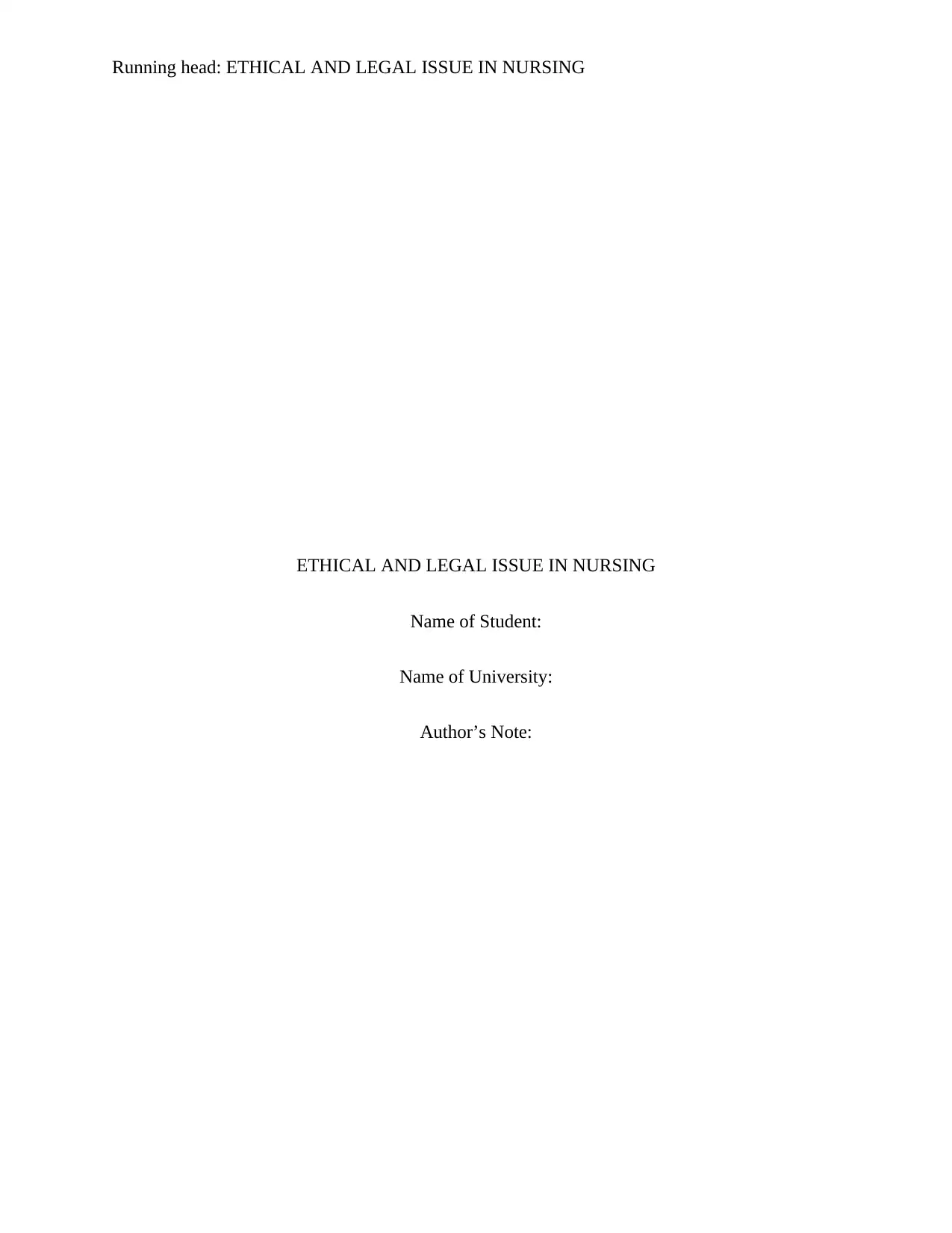
Running head: ETHICAL AND LEGAL ISSUE IN NURSING
ETHICAL AND LEGAL ISSUE IN NURSING
Name of Student:
Name of University:
Author’s Note:
ETHICAL AND LEGAL ISSUE IN NURSING
Name of Student:
Name of University:
Author’s Note:
Paraphrase This Document
Need a fresh take? Get an instant paraphrase of this document with our AI Paraphraser
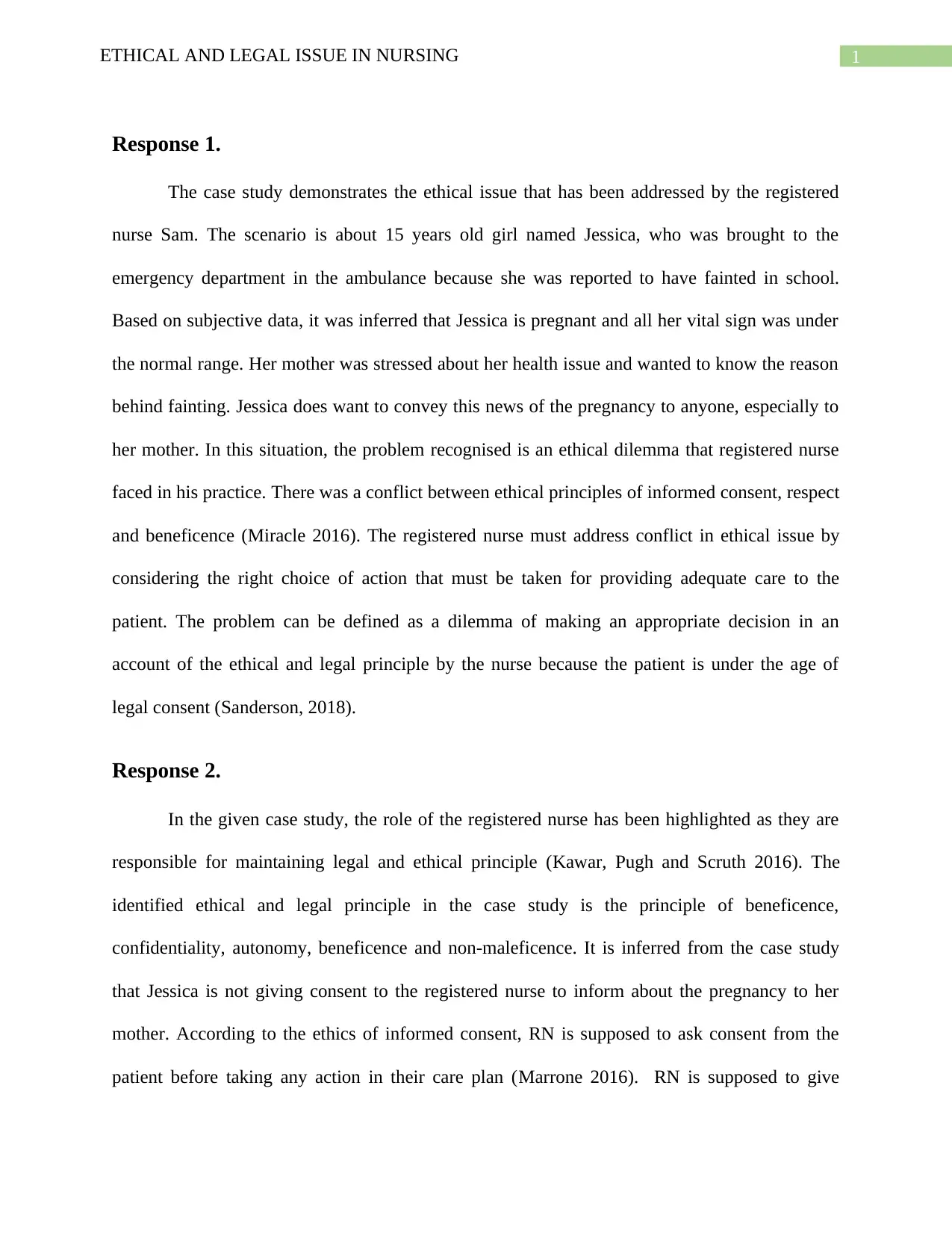
1ETHICAL AND LEGAL ISSUE IN NURSING
Response 1.
The case study demonstrates the ethical issue that has been addressed by the registered
nurse Sam. The scenario is about 15 years old girl named Jessica, who was brought to the
emergency department in the ambulance because she was reported to have fainted in school.
Based on subjective data, it was inferred that Jessica is pregnant and all her vital sign was under
the normal range. Her mother was stressed about her health issue and wanted to know the reason
behind fainting. Jessica does want to convey this news of the pregnancy to anyone, especially to
her mother. In this situation, the problem recognised is an ethical dilemma that registered nurse
faced in his practice. There was a conflict between ethical principles of informed consent, respect
and beneficence (Miracle 2016). The registered nurse must address conflict in ethical issue by
considering the right choice of action that must be taken for providing adequate care to the
patient. The problem can be defined as a dilemma of making an appropriate decision in an
account of the ethical and legal principle by the nurse because the patient is under the age of
legal consent (Sanderson, 2018).
Response 2.
In the given case study, the role of the registered nurse has been highlighted as they are
responsible for maintaining legal and ethical principle (Kawar, Pugh and Scruth 2016). The
identified ethical and legal principle in the case study is the principle of beneficence,
confidentiality, autonomy, beneficence and non-maleficence. It is inferred from the case study
that Jessica is not giving consent to the registered nurse to inform about the pregnancy to her
mother. According to the ethics of informed consent, RN is supposed to ask consent from the
patient before taking any action in their care plan (Marrone 2016). RN is supposed to give
Response 1.
The case study demonstrates the ethical issue that has been addressed by the registered
nurse Sam. The scenario is about 15 years old girl named Jessica, who was brought to the
emergency department in the ambulance because she was reported to have fainted in school.
Based on subjective data, it was inferred that Jessica is pregnant and all her vital sign was under
the normal range. Her mother was stressed about her health issue and wanted to know the reason
behind fainting. Jessica does want to convey this news of the pregnancy to anyone, especially to
her mother. In this situation, the problem recognised is an ethical dilemma that registered nurse
faced in his practice. There was a conflict between ethical principles of informed consent, respect
and beneficence (Miracle 2016). The registered nurse must address conflict in ethical issue by
considering the right choice of action that must be taken for providing adequate care to the
patient. The problem can be defined as a dilemma of making an appropriate decision in an
account of the ethical and legal principle by the nurse because the patient is under the age of
legal consent (Sanderson, 2018).
Response 2.
In the given case study, the role of the registered nurse has been highlighted as they are
responsible for maintaining legal and ethical principle (Kawar, Pugh and Scruth 2016). The
identified ethical and legal principle in the case study is the principle of beneficence,
confidentiality, autonomy, beneficence and non-maleficence. It is inferred from the case study
that Jessica is not giving consent to the registered nurse to inform about the pregnancy to her
mother. According to the ethics of informed consent, RN is supposed to ask consent from the
patient before taking any action in their care plan (Marrone 2016). RN is supposed to give
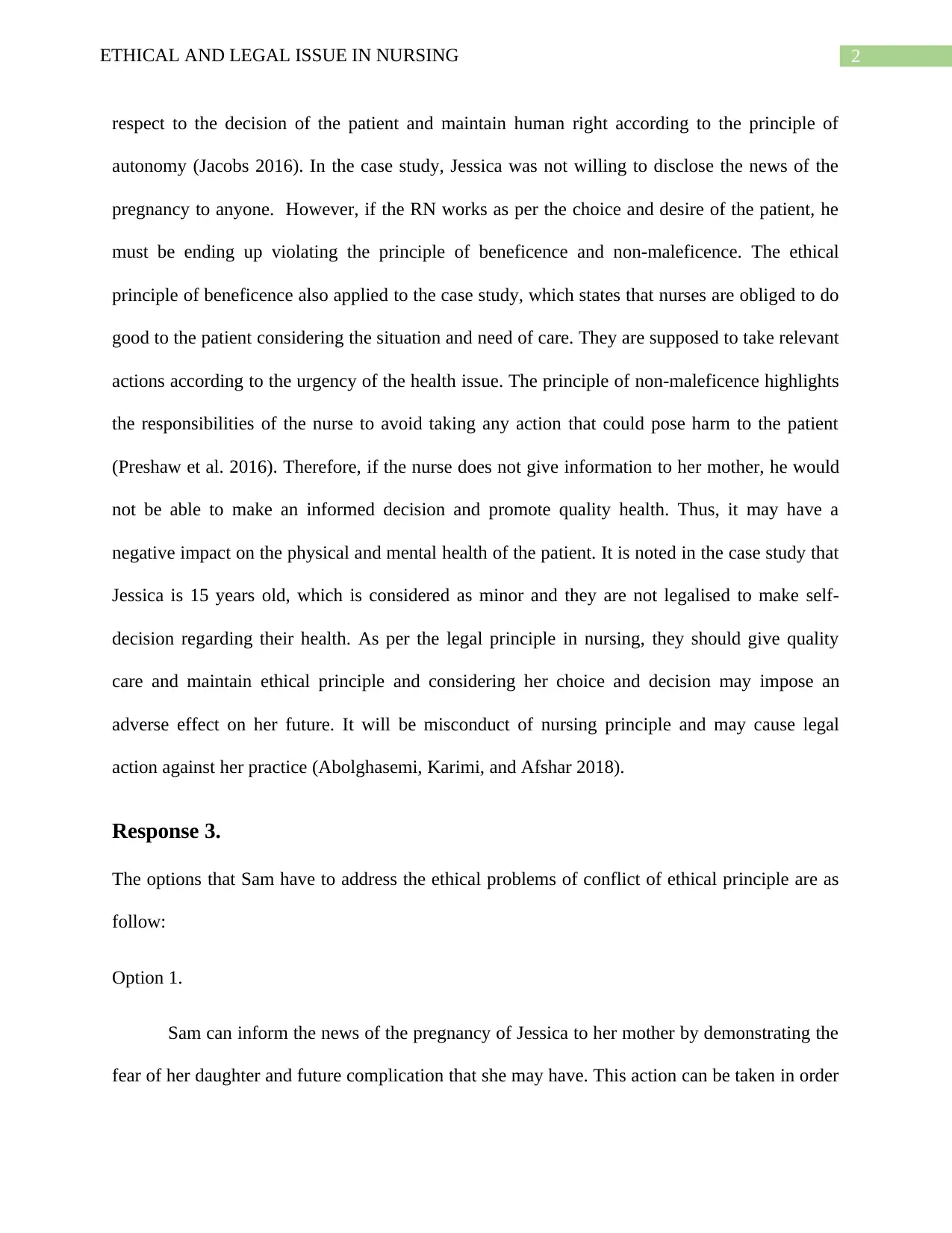
2ETHICAL AND LEGAL ISSUE IN NURSING
respect to the decision of the patient and maintain human right according to the principle of
autonomy (Jacobs 2016). In the case study, Jessica was not willing to disclose the news of the
pregnancy to anyone. However, if the RN works as per the choice and desire of the patient, he
must be ending up violating the principle of beneficence and non-maleficence. The ethical
principle of beneficence also applied to the case study, which states that nurses are obliged to do
good to the patient considering the situation and need of care. They are supposed to take relevant
actions according to the urgency of the health issue. The principle of non-maleficence highlights
the responsibilities of the nurse to avoid taking any action that could pose harm to the patient
(Preshaw et al. 2016). Therefore, if the nurse does not give information to her mother, he would
not be able to make an informed decision and promote quality health. Thus, it may have a
negative impact on the physical and mental health of the patient. It is noted in the case study that
Jessica is 15 years old, which is considered as minor and they are not legalised to make self-
decision regarding their health. As per the legal principle in nursing, they should give quality
care and maintain ethical principle and considering her choice and decision may impose an
adverse effect on her future. It will be misconduct of nursing principle and may cause legal
action against her practice (Abolghasemi, Karimi, and Afshar 2018).
Response 3.
The options that Sam have to address the ethical problems of conflict of ethical principle are as
follow:
Option 1.
Sam can inform the news of the pregnancy of Jessica to her mother by demonstrating the
fear of her daughter and future complication that she may have. This action can be taken in order
respect to the decision of the patient and maintain human right according to the principle of
autonomy (Jacobs 2016). In the case study, Jessica was not willing to disclose the news of the
pregnancy to anyone. However, if the RN works as per the choice and desire of the patient, he
must be ending up violating the principle of beneficence and non-maleficence. The ethical
principle of beneficence also applied to the case study, which states that nurses are obliged to do
good to the patient considering the situation and need of care. They are supposed to take relevant
actions according to the urgency of the health issue. The principle of non-maleficence highlights
the responsibilities of the nurse to avoid taking any action that could pose harm to the patient
(Preshaw et al. 2016). Therefore, if the nurse does not give information to her mother, he would
not be able to make an informed decision and promote quality health. Thus, it may have a
negative impact on the physical and mental health of the patient. It is noted in the case study that
Jessica is 15 years old, which is considered as minor and they are not legalised to make self-
decision regarding their health. As per the legal principle in nursing, they should give quality
care and maintain ethical principle and considering her choice and decision may impose an
adverse effect on her future. It will be misconduct of nursing principle and may cause legal
action against her practice (Abolghasemi, Karimi, and Afshar 2018).
Response 3.
The options that Sam have to address the ethical problems of conflict of ethical principle are as
follow:
Option 1.
Sam can inform the news of the pregnancy of Jessica to her mother by demonstrating the
fear of her daughter and future complication that she may have. This action can be taken in order
⊘ This is a preview!⊘
Do you want full access?
Subscribe today to unlock all pages.

Trusted by 1+ million students worldwide
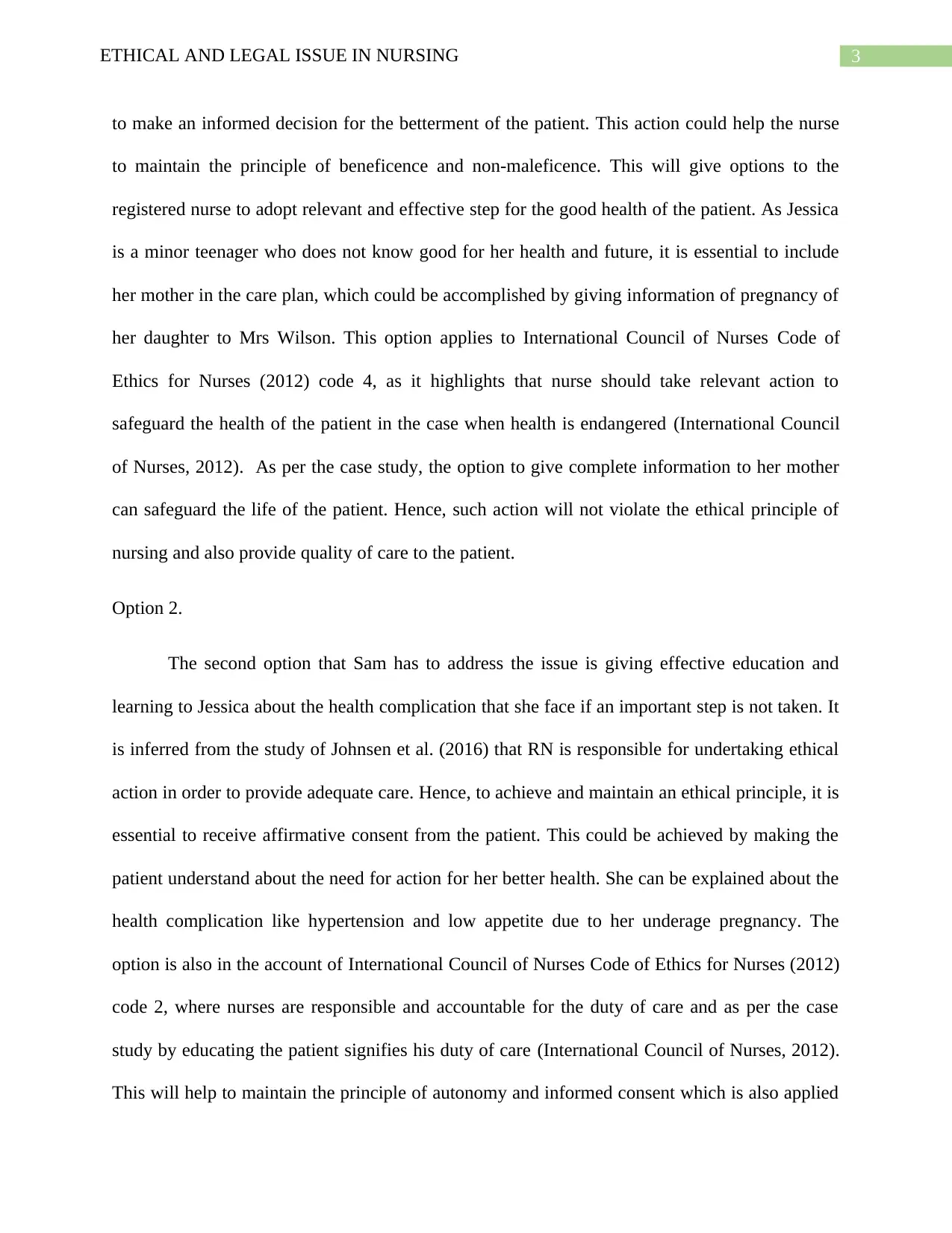
3ETHICAL AND LEGAL ISSUE IN NURSING
to make an informed decision for the betterment of the patient. This action could help the nurse
to maintain the principle of beneficence and non-maleficence. This will give options to the
registered nurse to adopt relevant and effective step for the good health of the patient. As Jessica
is a minor teenager who does not know good for her health and future, it is essential to include
her mother in the care plan, which could be accomplished by giving information of pregnancy of
her daughter to Mrs Wilson. This option applies to International Council of Nurses Code of
Ethics for Nurses (2012) code 4, as it highlights that nurse should take relevant action to
safeguard the health of the patient in the case when health is endangered (International Council
of Nurses, 2012). As per the case study, the option to give complete information to her mother
can safeguard the life of the patient. Hence, such action will not violate the ethical principle of
nursing and also provide quality of care to the patient.
Option 2.
The second option that Sam has to address the issue is giving effective education and
learning to Jessica about the health complication that she face if an important step is not taken. It
is inferred from the study of Johnsen et al. (2016) that RN is responsible for undertaking ethical
action in order to provide adequate care. Hence, to achieve and maintain an ethical principle, it is
essential to receive affirmative consent from the patient. This could be achieved by making the
patient understand about the need for action for her better health. She can be explained about the
health complication like hypertension and low appetite due to her underage pregnancy. The
option is also in the account of International Council of Nurses Code of Ethics for Nurses (2012)
code 2, where nurses are responsible and accountable for the duty of care and as per the case
study by educating the patient signifies his duty of care (International Council of Nurses, 2012).
This will help to maintain the principle of autonomy and informed consent which is also applied
to make an informed decision for the betterment of the patient. This action could help the nurse
to maintain the principle of beneficence and non-maleficence. This will give options to the
registered nurse to adopt relevant and effective step for the good health of the patient. As Jessica
is a minor teenager who does not know good for her health and future, it is essential to include
her mother in the care plan, which could be accomplished by giving information of pregnancy of
her daughter to Mrs Wilson. This option applies to International Council of Nurses Code of
Ethics for Nurses (2012) code 4, as it highlights that nurse should take relevant action to
safeguard the health of the patient in the case when health is endangered (International Council
of Nurses, 2012). As per the case study, the option to give complete information to her mother
can safeguard the life of the patient. Hence, such action will not violate the ethical principle of
nursing and also provide quality of care to the patient.
Option 2.
The second option that Sam has to address the issue is giving effective education and
learning to Jessica about the health complication that she face if an important step is not taken. It
is inferred from the study of Johnsen et al. (2016) that RN is responsible for undertaking ethical
action in order to provide adequate care. Hence, to achieve and maintain an ethical principle, it is
essential to receive affirmative consent from the patient. This could be achieved by making the
patient understand about the need for action for her better health. She can be explained about the
health complication like hypertension and low appetite due to her underage pregnancy. The
option is also in the account of International Council of Nurses Code of Ethics for Nurses (2012)
code 2, where nurses are responsible and accountable for the duty of care and as per the case
study by educating the patient signifies his duty of care (International Council of Nurses, 2012).
This will help to maintain the principle of autonomy and informed consent which is also applied
Paraphrase This Document
Need a fresh take? Get an instant paraphrase of this document with our AI Paraphraser
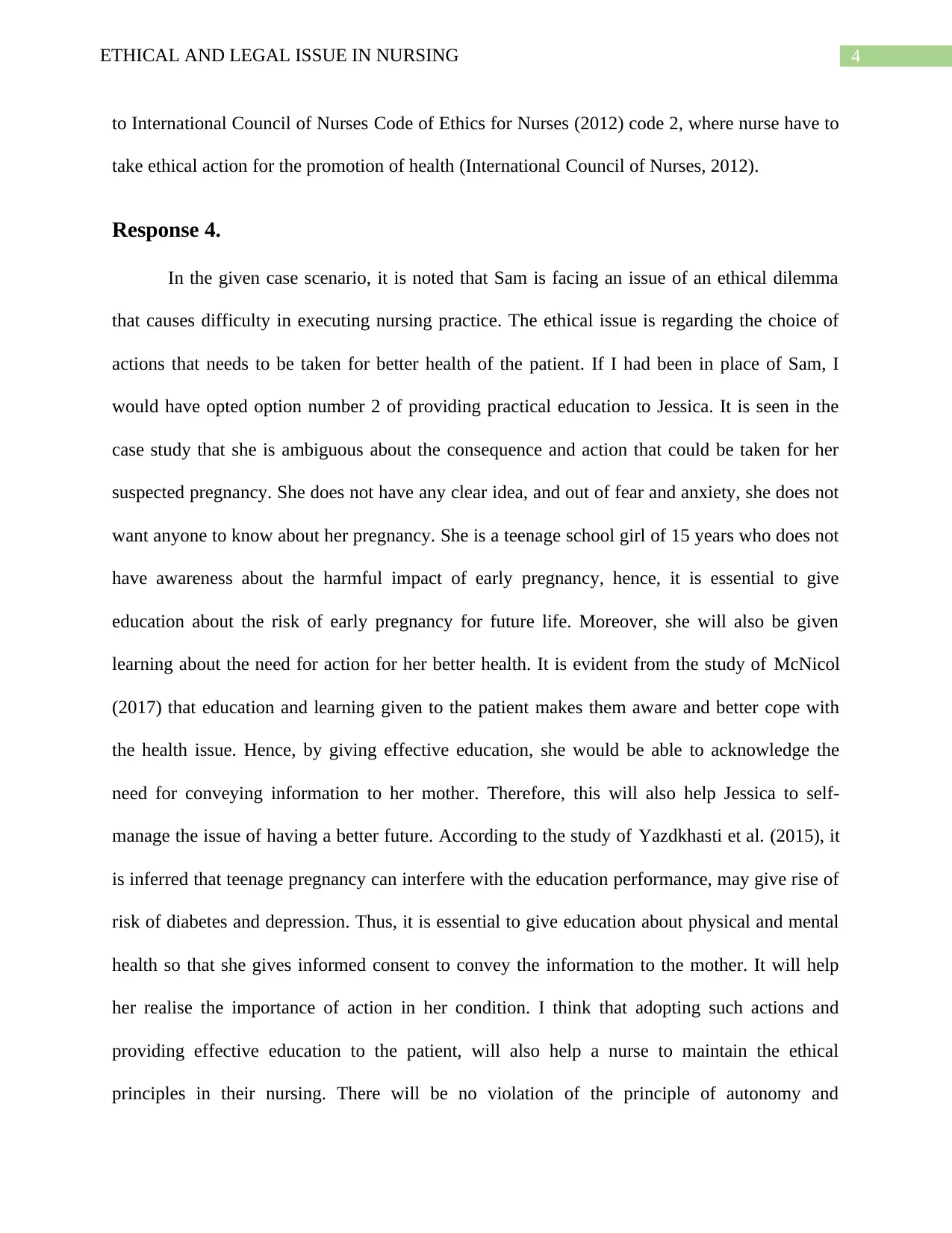
4ETHICAL AND LEGAL ISSUE IN NURSING
to International Council of Nurses Code of Ethics for Nurses (2012) code 2, where nurse have to
take ethical action for the promotion of health (International Council of Nurses, 2012).
Response 4.
In the given case scenario, it is noted that Sam is facing an issue of an ethical dilemma
that causes difficulty in executing nursing practice. The ethical issue is regarding the choice of
actions that needs to be taken for better health of the patient. If I had been in place of Sam, I
would have opted option number 2 of providing practical education to Jessica. It is seen in the
case study that she is ambiguous about the consequence and action that could be taken for her
suspected pregnancy. She does not have any clear idea, and out of fear and anxiety, she does not
want anyone to know about her pregnancy. She is a teenage school girl of 15 years who does not
have awareness about the harmful impact of early pregnancy, hence, it is essential to give
education about the risk of early pregnancy for future life. Moreover, she will also be given
learning about the need for action for her better health. It is evident from the study of McNicol
(2017) that education and learning given to the patient makes them aware and better cope with
the health issue. Hence, by giving effective education, she would be able to acknowledge the
need for conveying information to her mother. Therefore, this will also help Jessica to self-
manage the issue of having a better future. According to the study of Yazdkhasti et al. (2015), it
is inferred that teenage pregnancy can interfere with the education performance, may give rise of
risk of diabetes and depression. Thus, it is essential to give education about physical and mental
health so that she gives informed consent to convey the information to the mother. It will help
her realise the importance of action in her condition. I think that adopting such actions and
providing effective education to the patient, will also help a nurse to maintain the ethical
principles in their nursing. There will be no violation of the principle of autonomy and
to International Council of Nurses Code of Ethics for Nurses (2012) code 2, where nurse have to
take ethical action for the promotion of health (International Council of Nurses, 2012).
Response 4.
In the given case scenario, it is noted that Sam is facing an issue of an ethical dilemma
that causes difficulty in executing nursing practice. The ethical issue is regarding the choice of
actions that needs to be taken for better health of the patient. If I had been in place of Sam, I
would have opted option number 2 of providing practical education to Jessica. It is seen in the
case study that she is ambiguous about the consequence and action that could be taken for her
suspected pregnancy. She does not have any clear idea, and out of fear and anxiety, she does not
want anyone to know about her pregnancy. She is a teenage school girl of 15 years who does not
have awareness about the harmful impact of early pregnancy, hence, it is essential to give
education about the risk of early pregnancy for future life. Moreover, she will also be given
learning about the need for action for her better health. It is evident from the study of McNicol
(2017) that education and learning given to the patient makes them aware and better cope with
the health issue. Hence, by giving effective education, she would be able to acknowledge the
need for conveying information to her mother. Therefore, this will also help Jessica to self-
manage the issue of having a better future. According to the study of Yazdkhasti et al. (2015), it
is inferred that teenage pregnancy can interfere with the education performance, may give rise of
risk of diabetes and depression. Thus, it is essential to give education about physical and mental
health so that she gives informed consent to convey the information to the mother. It will help
her realise the importance of action in her condition. I think that adopting such actions and
providing effective education to the patient, will also help a nurse to maintain the ethical
principles in their nursing. There will be no violation of the principle of autonomy and
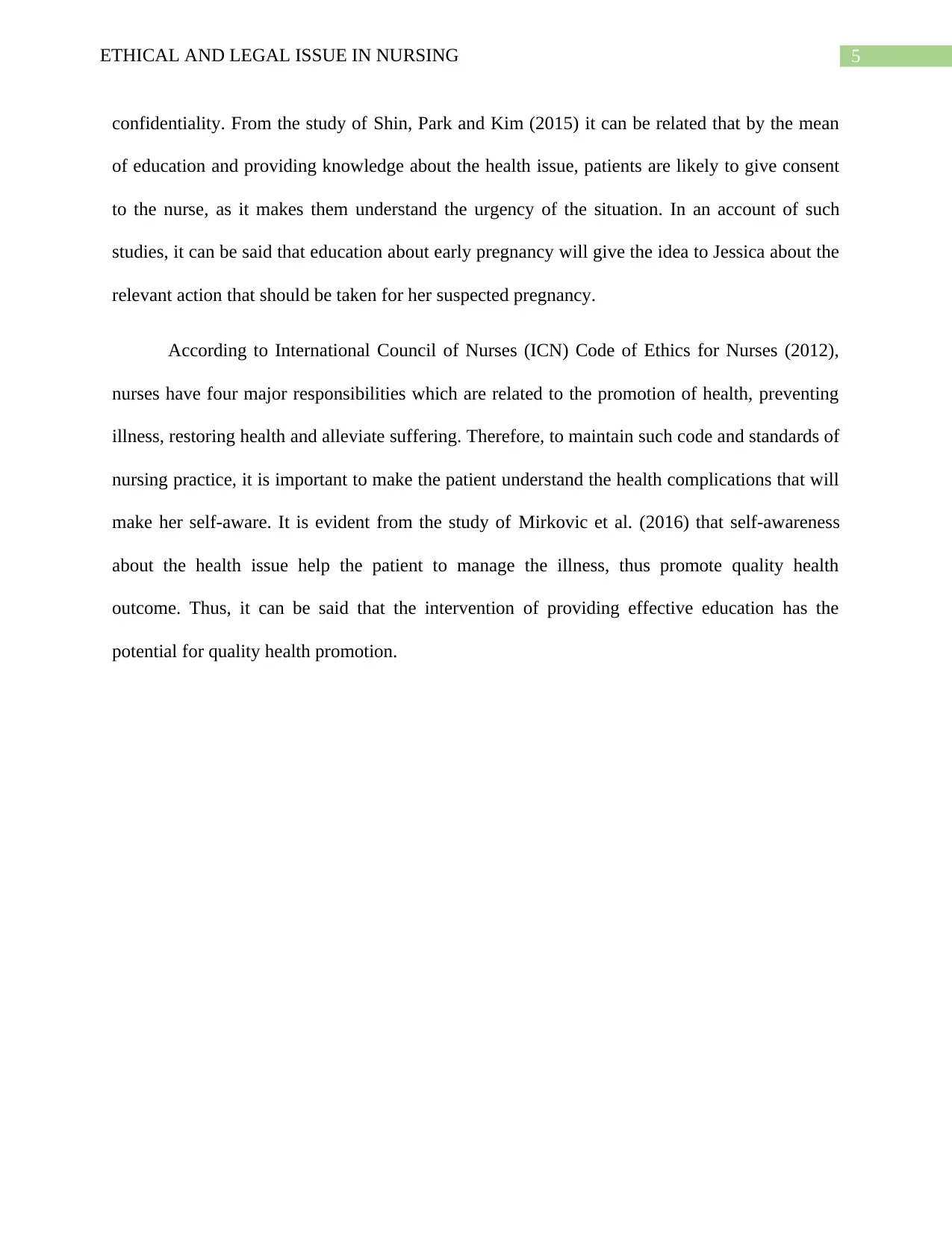
5ETHICAL AND LEGAL ISSUE IN NURSING
confidentiality. From the study of Shin, Park and Kim (2015) it can be related that by the mean
of education and providing knowledge about the health issue, patients are likely to give consent
to the nurse, as it makes them understand the urgency of the situation. In an account of such
studies, it can be said that education about early pregnancy will give the idea to Jessica about the
relevant action that should be taken for her suspected pregnancy.
According to International Council of Nurses (ICN) Code of Ethics for Nurses (2012),
nurses have four major responsibilities which are related to the promotion of health, preventing
illness, restoring health and alleviate suffering. Therefore, to maintain such code and standards of
nursing practice, it is important to make the patient understand the health complications that will
make her self-aware. It is evident from the study of Mirkovic et al. (2016) that self-awareness
about the health issue help the patient to manage the illness, thus promote quality health
outcome. Thus, it can be said that the intervention of providing effective education has the
potential for quality health promotion.
confidentiality. From the study of Shin, Park and Kim (2015) it can be related that by the mean
of education and providing knowledge about the health issue, patients are likely to give consent
to the nurse, as it makes them understand the urgency of the situation. In an account of such
studies, it can be said that education about early pregnancy will give the idea to Jessica about the
relevant action that should be taken for her suspected pregnancy.
According to International Council of Nurses (ICN) Code of Ethics for Nurses (2012),
nurses have four major responsibilities which are related to the promotion of health, preventing
illness, restoring health and alleviate suffering. Therefore, to maintain such code and standards of
nursing practice, it is important to make the patient understand the health complications that will
make her self-aware. It is evident from the study of Mirkovic et al. (2016) that self-awareness
about the health issue help the patient to manage the illness, thus promote quality health
outcome. Thus, it can be said that the intervention of providing effective education has the
potential for quality health promotion.
⊘ This is a preview!⊘
Do you want full access?
Subscribe today to unlock all pages.

Trusted by 1+ million students worldwide
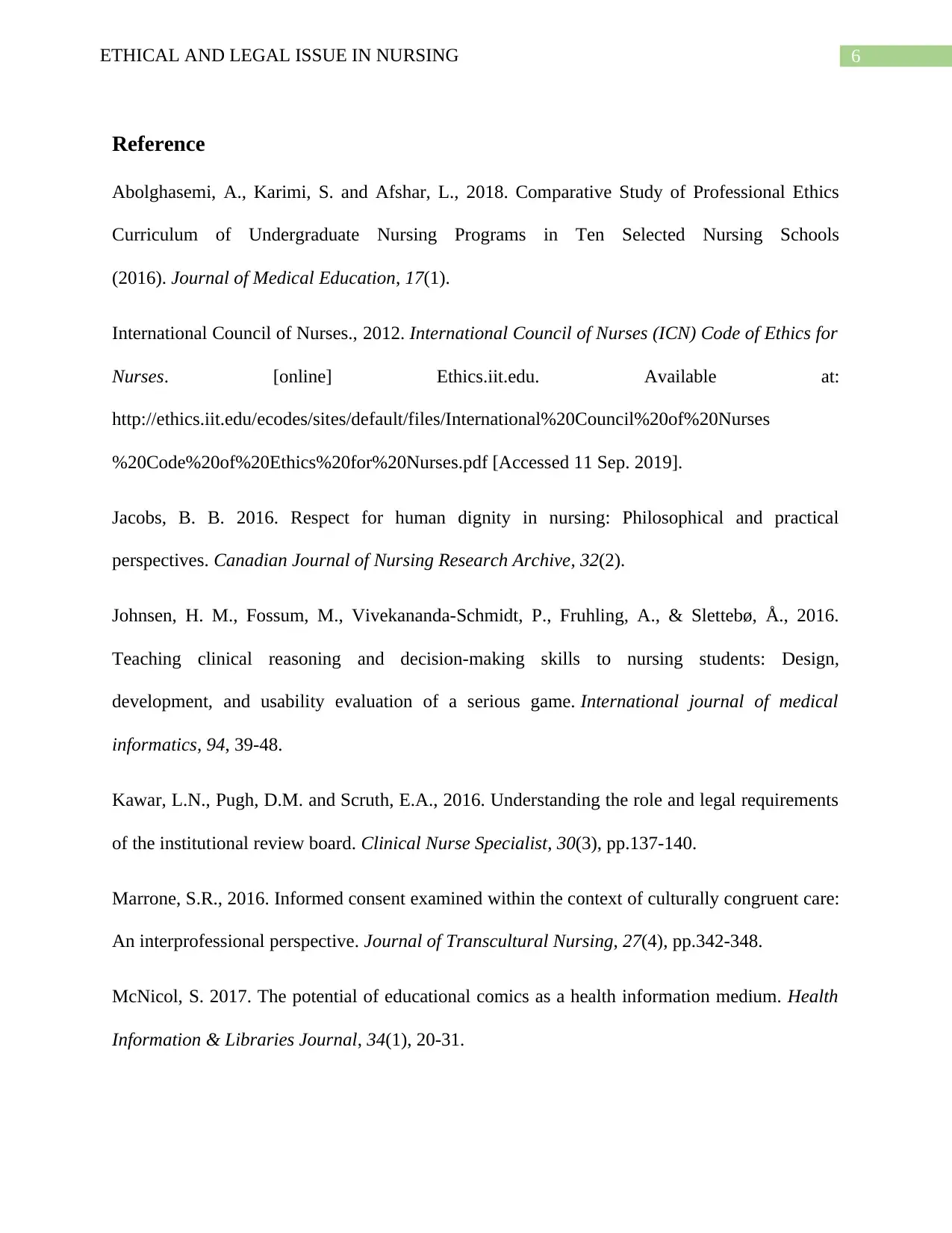
6ETHICAL AND LEGAL ISSUE IN NURSING
Reference
Abolghasemi, A., Karimi, S. and Afshar, L., 2018. Comparative Study of Professional Ethics
Curriculum of Undergraduate Nursing Programs in Ten Selected Nursing Schools
(2016). Journal of Medical Education, 17(1).
International Council of Nurses., 2012. International Council of Nurses (ICN) Code of Ethics for
Nurses. [online] Ethics.iit.edu. Available at:
http://ethics.iit.edu/ecodes/sites/default/files/International%20Council%20of%20Nurses
%20Code%20of%20Ethics%20for%20Nurses.pdf [Accessed 11 Sep. 2019].
Jacobs, B. B. 2016. Respect for human dignity in nursing: Philosophical and practical
perspectives. Canadian Journal of Nursing Research Archive, 32(2).
Johnsen, H. M., Fossum, M., Vivekananda-Schmidt, P., Fruhling, A., & Slettebø, Å., 2016.
Teaching clinical reasoning and decision-making skills to nursing students: Design,
development, and usability evaluation of a serious game. International journal of medical
informatics, 94, 39-48.
Kawar, L.N., Pugh, D.M. and Scruth, E.A., 2016. Understanding the role and legal requirements
of the institutional review board. Clinical Nurse Specialist, 30(3), pp.137-140.
Marrone, S.R., 2016. Informed consent examined within the context of culturally congruent care:
An interprofessional perspective. Journal of Transcultural Nursing, 27(4), pp.342-348.
McNicol, S. 2017. The potential of educational comics as a health information medium. Health
Information & Libraries Journal, 34(1), 20-31.
Reference
Abolghasemi, A., Karimi, S. and Afshar, L., 2018. Comparative Study of Professional Ethics
Curriculum of Undergraduate Nursing Programs in Ten Selected Nursing Schools
(2016). Journal of Medical Education, 17(1).
International Council of Nurses., 2012. International Council of Nurses (ICN) Code of Ethics for
Nurses. [online] Ethics.iit.edu. Available at:
http://ethics.iit.edu/ecodes/sites/default/files/International%20Council%20of%20Nurses
%20Code%20of%20Ethics%20for%20Nurses.pdf [Accessed 11 Sep. 2019].
Jacobs, B. B. 2016. Respect for human dignity in nursing: Philosophical and practical
perspectives. Canadian Journal of Nursing Research Archive, 32(2).
Johnsen, H. M., Fossum, M., Vivekananda-Schmidt, P., Fruhling, A., & Slettebø, Å., 2016.
Teaching clinical reasoning and decision-making skills to nursing students: Design,
development, and usability evaluation of a serious game. International journal of medical
informatics, 94, 39-48.
Kawar, L.N., Pugh, D.M. and Scruth, E.A., 2016. Understanding the role and legal requirements
of the institutional review board. Clinical Nurse Specialist, 30(3), pp.137-140.
Marrone, S.R., 2016. Informed consent examined within the context of culturally congruent care:
An interprofessional perspective. Journal of Transcultural Nursing, 27(4), pp.342-348.
McNicol, S. 2017. The potential of educational comics as a health information medium. Health
Information & Libraries Journal, 34(1), 20-31.
Paraphrase This Document
Need a fresh take? Get an instant paraphrase of this document with our AI Paraphraser

7ETHICAL AND LEGAL ISSUE IN NURSING
Miracle, V.A., 2016. The Belmont Report: The triple crown of research ethics. Dimensions of
Critical Care Nursing, 35(4), pp.223-228.
Mirkovic, J., Kristjansdottir, O. B., Stenberg, U., Krogseth, T., Stange, K. C., and Ruland, C. M.
2016. Patient insights into the design of technology to support a strengths-based approach to
health care. JMIR research protocols, 5(3), e175.
Preshaw, D. H., Brazil, K., McLaughlin, D., and Frolic, A. 2016. Ethical issues experienced by
healthcare workers in nursing homes: literature review. Nursing ethics, 23(5), 490-506.
Sanderson, C. D., 2018. Ethical and bioethical issues in nursing and health care. Contemporary
Nursing E-Book: Issues, Trends, & Management, 161.
Sanderson, C.D., 2018. Ethical and bioethical issues in nursing and health care. Contemporary
Nursing E-Book: Issues, Trends, & Management, p.161.
Shin, S., Park, J.H. and Kim, J.H., 2015. Effectiveness of patient simulation in nursing
education: meta-analysis. Nurse education today, 35(1), pp.176-182.
Yazdkhasti, M., Pourreza, A., Pirak, A. and Abdi, F., 2015. Unintended pregnancy and its
adverse social and economic consequences on health system: a narrative review article. Iranian
journal of public health, 44(1), p.12.
Miracle, V.A., 2016. The Belmont Report: The triple crown of research ethics. Dimensions of
Critical Care Nursing, 35(4), pp.223-228.
Mirkovic, J., Kristjansdottir, O. B., Stenberg, U., Krogseth, T., Stange, K. C., and Ruland, C. M.
2016. Patient insights into the design of technology to support a strengths-based approach to
health care. JMIR research protocols, 5(3), e175.
Preshaw, D. H., Brazil, K., McLaughlin, D., and Frolic, A. 2016. Ethical issues experienced by
healthcare workers in nursing homes: literature review. Nursing ethics, 23(5), 490-506.
Sanderson, C. D., 2018. Ethical and bioethical issues in nursing and health care. Contemporary
Nursing E-Book: Issues, Trends, & Management, 161.
Sanderson, C.D., 2018. Ethical and bioethical issues in nursing and health care. Contemporary
Nursing E-Book: Issues, Trends, & Management, p.161.
Shin, S., Park, J.H. and Kim, J.H., 2015. Effectiveness of patient simulation in nursing
education: meta-analysis. Nurse education today, 35(1), pp.176-182.
Yazdkhasti, M., Pourreza, A., Pirak, A. and Abdi, F., 2015. Unintended pregnancy and its
adverse social and economic consequences on health system: a narrative review article. Iranian
journal of public health, 44(1), p.12.
1 out of 8
Related Documents
Your All-in-One AI-Powered Toolkit for Academic Success.
+13062052269
info@desklib.com
Available 24*7 on WhatsApp / Email
![[object Object]](/_next/static/media/star-bottom.7253800d.svg)
Unlock your academic potential
Copyright © 2020–2026 A2Z Services. All Rights Reserved. Developed and managed by ZUCOL.




